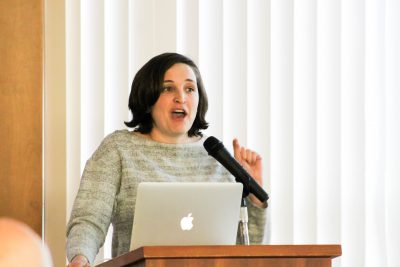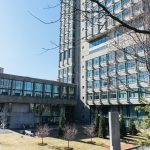
Boston University’s College of Arts and Sciences hosted a lecture titled “Understanding and Improving our Urban Climate” Monday, which addressed present and future issues facing urban climates such as fossil fuels and infrastructure.
The lecture, which took place at BU Hillel, featured speakers from throughout the university and campus environmental organizations, such as Sustainability@BU.
Madhu Dutta-Koehler, director of the City Planning and Urban Affairs Program in the Metropolitan College, spoke during the lecture about the need for equal and increased access to green spaces in Boston as well as the effects of urban climate issues on low-income communities.
“There are quite a few communities which come to mind, which are suffering from things such as heat vulnerability and have no access to parks or green spaces,” Koehler said. “Some of those communities are in Roxbury or in Mattapan, and it is important that the city look into how to make equal access to these resources.”
Despite lower-income communities often needing the most initiative, the city doesn’t often focus on those areas, Koehler said.
She also spoke about the sustainability accomplishments the city has made so far, including the fact that a park is a 10 minute walk from any Boston resident and that Boston ranks 18th among cities for urban tree canopy.
Still, Koehler said, that isn’t enough.
“We are as strong as our weakest link,” she said. “I think things are going to change, and I think things will change for the better, but I’m not sure if they are going to change fast.”
Cutler Cleveland, a professor of earth and environment in CAS and faculty advisor for the Institute of Sustainable Energy, presented on the need to help rid Boston of fossil fuels.
Cleveland suggested strategies such as investing more in biking and public transit, as well as electrifying vehicles to make them more energy efficient.
Joshua Lacey-Baldwin, a freshman in CAS, said that it was important to have green space like parks in urban environments.
“Green space definitely makes people feel a lot better and calmer, and that’s especially important,” Baldwin said.
He also suggested investment in city services such as the T to help combat climate change in Boston.
“Better transit reform would keep more cars off the road and would, therefore, make a cleaner city,” he said.
Bonnie Ngai, a freshman in the Questrom School of Business, said he believes BU does a good job keeping the campus clean.
“Most campus areas are pretty clean,” he said. “People usually clean up after themselves, which is great. Construction is a bummer, though.”
Gavin Wei, also a Questrom freshman, said that city climate is important for students and professors to focus on and that Boston is already a leader in this area.
“It’s very important, especially for people living in the city,” Wei said. “I think Boston is a very clean city compared to most American cities.”




